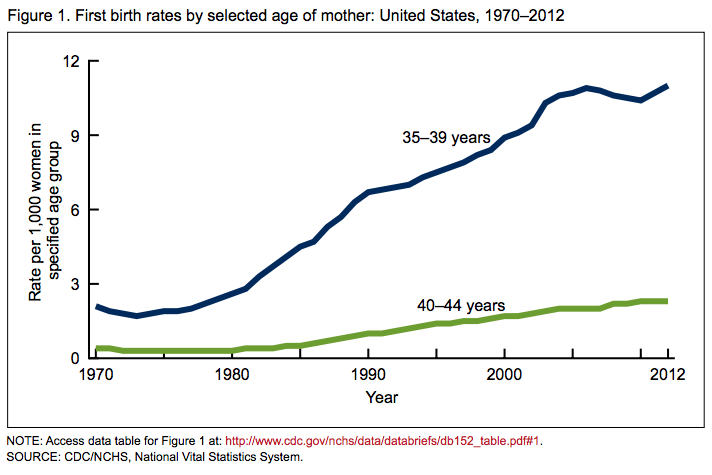The case for “Leaning In” — prioritizing career over landing a man and starting a family — has some fresh new data to support it: The number of women having kids after age 35 is again on the rise, according to a CDC report.
The average age of women at their first birth has also risen over the past 4 decades, and since 2000, 46 states and DC have experienced a rise in the first-birth rate for women over 35.
“We are definitely seeing this in our practices,” says Dr. Rebecca Starck, chair of the department of regional obstetrics and gynecology at Cleveland Clinic. Given what we know about the risks associated with pregnancy at later ages, should we be worried?
“A healthy 40 year old can have a much less risky pregnancy than a healthy 28 year old,” says Starck, especially if she prepares her body for pregnancy with healthy food and exercise. Once pregnant, eating well, gaining the right amount of weight and abstaining from harmful behaviors like smoking also make a big difference.
The new report also shows that first time older mothers are generally more educated and more likely to have more resources like higher incomes than women of the youngest reproductive ages.

But the over-35 set still tend to face more risks and complications. For instance, the risks of having a child with a genetic disorder rise after 40, says Starck. It’s still very likely the baby will be healthy and won’t have a chromosome problem, she adds, but the risk does go up proportionally with age.
Why is there a greater risk? It’s because females are born with a limited supply of eggs, and just as all other parts of the body age, so do eggs. During the dividing processes, chromosomes are more likely to become displaced in older eggs, and that can lead to problems.
“That being said, many women in these advance maternal age groups will do just great,” says Dr. Starck. “While we do watch them more carefully, we don’t want people to fear that they absolutely can’t and shouldn’t get pregnant after age 35. It’s not an absolute risk, it’s a relative risk.”
Even so, Starck says it’s important to have these conversations early, so that women can plan ahead if necessary. She doesn’t like seeing her patients come in in a panic over it being potentially too late to have kids.
“Every woman has to make her own decision, but for those women who are very adamant that they do want children and are concerned about their risks, [egg freezing] is something to consider,” says Starck.
According to 2012 data from the CDC, the use of assisted reproductive technology (ART), like in vitro fertilization, is still rare compared to the potential demand for it. But use of ART has doubled over the past decade, and today 1% of all babies born in the U.S. every year are conceived via ART.
More Must-Reads from TIME
- Donald Trump Is TIME's 2024 Person of the Year
- Why We Chose Trump as Person of the Year
- Is Intermittent Fasting Good or Bad for You?
- The 100 Must-Read Books of 2024
- The 20 Best Christmas TV Episodes
- Column: If Optimism Feels Ridiculous Now, Try Hope
- The Future of Climate Action Is Trade Policy
- Merle Bombardieri Is Helping People Make the Baby Decision
Contact us at letters@time.com